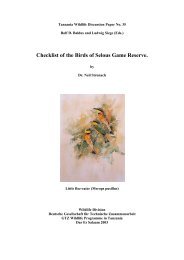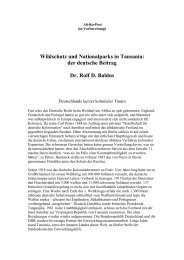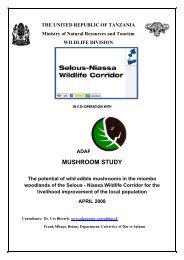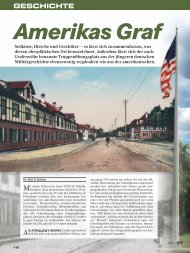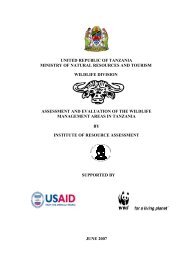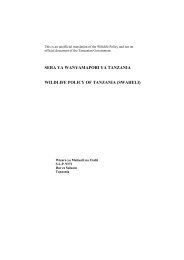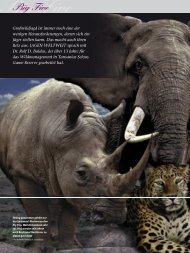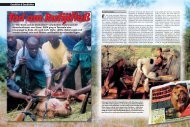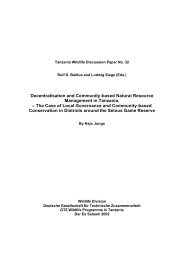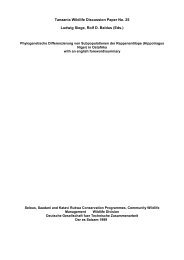African Indaba Articles - wildlife-baldus.com
African Indaba Articles - wildlife-baldus.com
African Indaba Articles - wildlife-baldus.com
You also want an ePaper? Increase the reach of your titles
YUMPU automatically turns print PDFs into web optimized ePapers that Google loves.
“Use it or loose it” – Consumptive Use in EcotourismCIC Press Release, Budapest, 23 May 2007Facing their own footprints, the global ecotourism <strong>com</strong>munity <strong>com</strong>es to realize the quality and valuesof consumptive use through hunting and fishing tourism. CIC stressed the potential of sustainablehunting tourism for conservation and regional development at major global gathering in Oslo.The International Ecotourism Society (TIES), Ecotourism Norway and the United Nations EnvironmentProgram (UNEP) organized the Global Ecotourism Conference, held in Oslo May 14-16 2007. Thisgathering was the first major global conference on ecotourism since the UN's International Year ofEcotourism in Quebec in 2002 and brought together representatives of governments, national and regionalecotourism associations, tourism professionals and NGOs from 76 countries worldwide. All relevant topics ofthe industry were discussed within five different working-sessions. The International Council for Game andWildlife Conservation (CIC) participated and underlined the links between Ecotourism and sustainablehunting tourism.At the opening ceremony, the Norwegian Environment Minister Helen Bjoernoey pointed out that even theecotourism-<strong>com</strong>munity has to address that "long distance travel by eco-travelers has serious impacts on theclimate and <strong>wildlife</strong> as well".Wolfgang Strasdas, professor for Sustainable Tourism Management at the German University of AppliedSciences in Eberswalde, pointed out that an "elimination of exotic trips would end up in a disaster for poorregions and countries regarding revenues through tourism”. Sustainable tourism management with newapproaches and concepts is needed to maximize the benefits of tourism. On this background, new innovativeapproaches, environment management systems and consumptive use even in the form of hunting andfishing tourism were discussed extensively.Oliver Hillel, Program Officer at the Secretariat of the Convention on Biological Diversity (CBD),highlighted during a special session the importance of different approaches. He underlined that “Ecotourismdoes not simply equal conservation, but rather refers to sustainable use of biodiversity in support ofconservation”. He also stressed that well-managed use of biodiversity for example through hunting tourismcan meet the needs of local <strong>com</strong>munities and <strong>wildlife</strong> conservation at the same time.Kolja Zimmermann, Coordinator of CIC’s Sustainable Hunting Tourism Program, outlined the potentialsand chances of consumptive use by sustainable hunting tourism to the audience. He pinpointed the quality ofhunting tourism as “a small-scale tourism with outstanding monetary, ecological and socio-cultural benefits torural areas”.Zimmermann is persuaded that a well managed hunting tourism meets the concept of Ecotourism andcould be one potential solution for sustainable regional development. “There are often different solutions fortourism development” explained Zimmermann.“Under appropriate circumstances it is wise to go for a mix of different solutions at the same time”. This isrealized many times in Africa e.g. through a <strong>com</strong>bination of photo- and hunting tourism in the Selous GameReserve (Tanzania) or at game ranches in Namibia and South Africa.During the session, he described the development process of “principles and guidelines for sustainablehunting tourism” as part of the CIC Program Sustainable Hunting Tourism. (Editor’s note: Download thePowerPoint presentation of Kolja Zimmermann here and his manuscript on this link from the officialconference website).A draft statement of the conference, to be approved in June 2007, is focusing on sustainable tourism “thatentails responsible travel to natural areas and which conserves the environment and sustains the well-beingof local people.”To maximize the benefits out of tourism for local <strong>com</strong>munities and <strong>wildlife</strong> conservation, Zimmermannpromoted the idea: “Let many flowers grow… and one of these flowers could indeed be sustainable huntingtourism.”141



